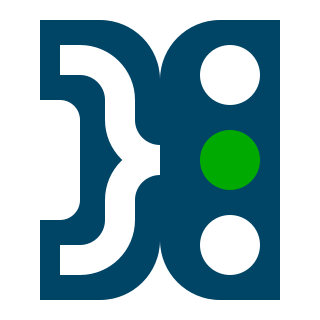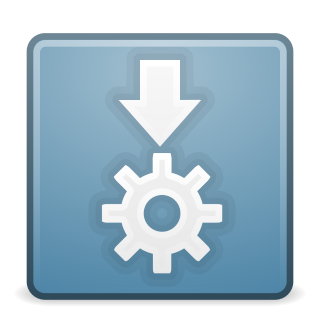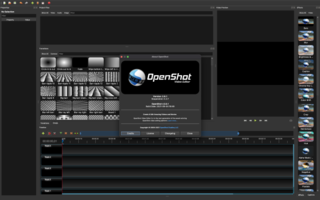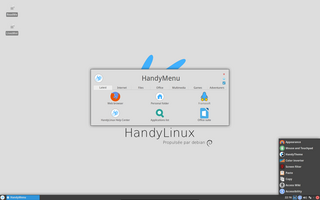
Free software or libre software, infrequently known as freedom-respecting software, is computer software distributed under terms that allow users to run the software for any purpose as well as to study, change, and distribute it and any adapted versions. Free software is a matter of liberty, not price; all users are legally free to do what they want with their copies of a free software regardless of how much is paid to obtain the program. Computer programs are deemed "free" if they give end-users ultimate control over the software and, subsequently, over their devices.
In computing, cross-platform software is computer software that is designed to work in several computing platforms. Some cross-platform software requires a separate build for each platform, but some can be directly run on any platform without special preparation, being written in an interpreted language or compiled to portable bytecode for which the interpreters or run-time packages are common or standard components of all supported platforms.

CinePaint is a free and open source computer program for painting and retouching bitmap frames of films. It is a fork of version 1.0.4 of the GNU Image Manipulation Program (GIMP). It enjoyed some success as one of the earliest open source tools developed for feature motion picture visual effects and animation work. The main reason for this adoption over mainline GIMP was its support for high bit depths which can be required for film work. The mainline GIMP project later added high bit depths in GIMP 2.9.2, released November 2015. It is free software under the GPL-2.0-or-later. In 2018, a post titled "CinePaint 2.0 Making Progress" announced progress, but version 2.0 has not been released as of 2022.
The GNU toolchain is a broad collection of programming tools produced by the GNU Project. These tools form a toolchain used for developing software applications and operating systems.
Disk cloning is the process of creating a 1-to-1 copy of a hard disk drive (HDD) or solid-state drive (SSD), not just its files. Disk cloning may be used for upgrading a disk or replacing an aging disk with a fresh one. In this case, the clone can replace the original disk in its host computer. Disk cloning may also be used for disaster recovery or forensics. In the context of backup software, disk cloning is very similar to disk imaging; in case of the latter, a 1-to-1 copy of a disk is created inside a disk image file.

Ubuntu is a Linux distribution based on Debian and composed mostly of free and open-source software. Ubuntu is officially released in three editions: Desktop, Server, and Core for Internet of things devices and robots. All the editions can run on the computer alone, or in a virtual machine. Ubuntu is a popular operating system for cloud computing, with support for OpenStack. Ubuntu's default desktop has been GNOME since version 17.10.

Xpdf is a free and open-source PDF viewer for operating systems supported by the Qt toolkit. Versions prior to 4.00 were written for the X Window System and Motif.

AppImage is a format for distributing portable software on Linux without needing superuser permissions to install the application. It tries also to allow Linux distribution-agnostic binary software deployment for application developers, also called upstream packaging. Released first in 2004 under the name klik, it was continuously developed, then renamed in 2011 to PortableLinuxApps and later in 2013 to AppImage.
PDFtk is a toolkit for manipulating Portable Document Format (PDF) documents. It runs on Linux, Windows and MacOS. It comes in three versions: PDFtk Server, PDFtk Free (freeware) and PDFtk Pro. It is able to concatenate, shuffle, split and rotate PDF files. It can also show and update metadata.
The Embeddable Linux Kernel Subset (ELKS), formerly known as Linux-8086, is a Linux-like operating system kernel. It is a subset of the Linux kernel, intended for 16-bit computers with limited processor and memory resources such as machines powered by Intel 8086 and compatible microprocessors not supported by 32-bit Linux.
Ntfsprogs was a collection of free Unix utilities for managing the NTFS file system used by the Windows NT operating system on a hard disk partition. 'ntfsprogs' was the first stable method of writing to NTFS partitions in Linux.
Microsoft Deployment Toolkit is a free software package from Microsoft for automating the deployment of Windows 10, Server 2019 and older Windows Server and desktop operating systems.

Clonezilla is a suite of open source drive cloning, drive imaging and system deployment utilities used to simplify deployment and maintenance of a group of computers. Clonezilla Server Edition uses multicast technologies to deploy a single image file to a group of computers on a local area network. Clonezilla was designed by Steven Shiau and developed by the NCHC Free Software Labs in Taiwan.

OpenShot Video Editor is a free and open-source video editor for Windows, macOS, Linux, and Chrome OS. The project started in August 2008 by Jonathan Thomas, with the objective of providing a stable, free, and friendly to use video editor.

The Trinity Desktop Environment (TDE) is a complete software desktop environment designed for Linux and Unix-like operating systems, intended for computer users preferring a traditional desktop model, and is free/libre software. Born as a fork of KDE 3.5 back in 2010, it was originally created by Timothy Pearson, who had coordinated Kubuntu remixes featuring KDE 3.5 after Kubuntu switched to KDE Plasma 4.

Kali Linux is a Debian-derived Linux distribution designed for digital forensics and penetration testing. It is maintained and funded by Offensive Security.

Raspberry Pi OS is a Unix-like operating system based on the Debian Linux distribution for the Raspberry Pi family of compact single-board computers. First developed independently in 2012, it has been produced as the primary operating system for these boards since 2013, distributed by the Raspberry Pi Foundation.

HandyLinux is a simplified Linux operating system developed in France, derived from the Debian stable branch. It was designed to be easily accessible and downloadable, so that it could be used by people with very little computer experience and on a range of older hardware that was no longer supported by the latest versions of proprietary operating systems. It was particularly aimed at older people with dated hardware who do not need nor possess the skill to use many features afforded by state-of-the-art operating systems.

Universal USB Installer (UUI) is an open-source live Linux USB flash drive creation software. It allows users to create a bootable live USB flash drive using an ISO image from a supported Linux distribution, antivirus utility, system tool, or Microsoft Windows installer. The USB boot software can also be used to make Windows 8, 10, or 11 run entirely from USB.












